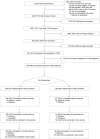Impact of Collaborative Care for Underserved Patients with PTSD in Primary Care: a Randomized Controlled Trial
- PMID: 26850413
- PMCID: PMC4835392
- DOI: 10.1007/s11606-016-3588-3
Impact of Collaborative Care for Underserved Patients with PTSD in Primary Care: a Randomized Controlled Trial
Abstract
Background: The effectiveness of collaborative care of mental health problems is clear for depression and growing but mixed for anxiety disorders, including posttraumatic stress disorder (PTSD). We know little about whether collaborative care can be effective in settings that serve low-income patients such as Federally Qualified Health Centers (FQHCs).
Objective: We compared the effectiveness of minimally enhanced usual care (MEU) versus collaborative care for PTSD with a care manager (PCM).
Design: This was a multi-site patient randomized controlled trial of PTSD care improvement over 1 year.
Participants: We recruited and enrolled 404 patients in six FQHCs from June 2010 to October 2012. Patients were eligible if they had a primary care appointment, no obvious physical or cognitive obstacles to participation, were age 18-65 years, planned to continue care at the study location for 1 year, and met criteria for a past month diagnosis of PTSD.
Main measures: The main outcomes were PTSD diagnosis and symptom severity (range, 0-136) based on the Clinician-Administered PTSD Scale (CAPS). Secondary outcomes were medication and counseling for mental health problems, and health-related quality of life assessed at baseline, 6 months, and 12 months.
Key results: Patients in both conditions improved similarly over the 1-year evaluation period. At 12 months, PTSD diagnoses had an absolute decrease of 56.7% for PCM patients and 60.6% for MEU patients. PTSD symptoms decreased by 26.8 and 24.2 points, respectively. MEU and PCM patients also did not differ in process of care outcomes or health-related quality of life. Patients who actually engaged in care management had mental health care visits that were 14% higher (p < 0.01) and mental health medication prescription rates that were 15.2% higher (p < 0.01) than patients with no engagement.
Conclusions: A minimally enhanced usual care intervention was similarly effective as collaborative care for patients in FQHCs.
Keywords: PTSD; community based interventions; medicaid; mental health; primary care.
Conflict of interest statement
The authors declare that they do not have a conflict of interest.
Figures
Comment in
-
Capsule Commentary on Meredith et al., Impact of Collaborative Care for Underserved Patients with PTSD in Primary Care: A Randomized Controlled Trial.J Gen Intern Med. 2016 May;31(5):536. doi: 10.1007/s11606-016-3646-x. J Gen Intern Med. 2016. PMID: 26956137 Free PMC article. No abstract available.
-
Current evidence does not support the widespread use of collaborative care for PTSD, but it is limited by not evaluating context.Evid Based Med. 2016 Oct;21(5):176. doi: 10.1136/ebmed-2016-110482. Epub 2016 Aug 22. Evid Based Med. 2016. PMID: 27549613 No abstract available.
Similar articles
-
Implementing collaborative primary care for depression and posttraumatic stress disorder: design and sample for a randomized trial in the U.S. military health system.Contemp Clin Trials. 2014 Nov;39(2):310-9. doi: 10.1016/j.cct.2014.10.002. Epub 2014 Oct 12. Contemp Clin Trials. 2014. PMID: 25311446 Clinical Trial.
-
Centrally Assisted Collaborative Telecare for Posttraumatic Stress Disorder and Depression Among Military Personnel Attending Primary Care: A Randomized Clinical Trial.JAMA Intern Med. 2016 Jul 1;176(7):948-56. doi: 10.1001/jamainternmed.2016.2402. JAMA Intern Med. 2016. PMID: 27294447 Clinical Trial.
-
Design of the Violence and Stress Assessment (ViStA) study: a randomized controlled trial of care management for PTSD among predominantly Latino patients in safety net health centers.Contemp Clin Trials. 2014 Jul;38(2):163-72. doi: 10.1016/j.cct.2014.04.005. Epub 2014 Apr 18. Contemp Clin Trials. 2014. PMID: 24747932 Free PMC article. Clinical Trial.
-
Traumatized refugees: morbidity, treatment and predictors of outcome.Dan Med J. 2014 Aug;61(8):B4871. Dan Med J. 2014. PMID: 25162447 Review.
-
Psychological therapies for the treatment of post-traumatic stress disorder in children and adolescents (Review).Evid Based Child Health. 2013 May;8(3):1004-116. doi: 10.1002/ebch.1916. Evid Based Child Health. 2013. PMID: 23877914 Review.
Cited by
-
The Integration of Behavioral Health and Primary Care for Hispanic/Latino Patients with Depression and Comorbid PTSD.J Behav Health Serv Res. 2023 Jan;50(1):95-107. doi: 10.1007/s11414-022-09824-1. Epub 2022 Nov 9. J Behav Health Serv Res. 2023. PMID: 36352161 Free PMC article.
-
Interventions to treat posttraumatic stress disorder in partnership with primary care: A review of feasibility and large randomized controlled studies.Gen Hosp Psychiatry. 2019 Sep-Oct;60:65-75. doi: 10.1016/j.genhosppsych.2019.05.008. Epub 2019 Jun 4. Gen Hosp Psychiatry. 2019. PMID: 31349204 Free PMC article. Review.
-
Personalized care planning and shared decision making in collaborative care programs for depression and anxiety disorders: A systematic review.PLoS One. 2022 Jun 10;17(6):e0268649. doi: 10.1371/journal.pone.0268649. eCollection 2022. PLoS One. 2022. PMID: 35687610 Free PMC article.
-
Patient Perspectives on Adapting Collaborative Care for Opioid Use Disorder With Depression and/or Post-traumatic Stress Disorder.Prog Community Health Partnersh. 2024;18(3):309-321. Prog Community Health Partnersh. 2024. PMID: 39308375 Free PMC article.
-
Collaboration Leading to Addiction Treatment and Recovery from Other Stresses (CLARO): process of adapting collaborative care for co-occurring opioid use and mental disorders.Addict Sci Clin Pract. 2022 Apr 8;17(1):25. doi: 10.1186/s13722-022-00302-9. Addict Sci Clin Pract. 2022. PMID: 35395811 Free PMC article.
References
Publication types
MeSH terms
Grants and funding
LinkOut - more resources
Full Text Sources
Other Literature Sources
Medical
Miscellaneous


